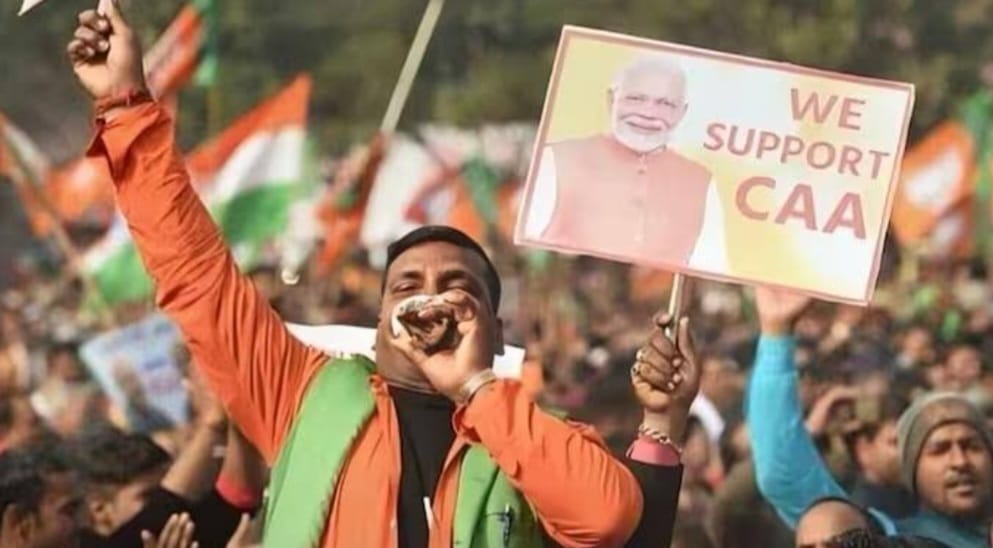Ahead of the General Elections 2024, the Central Government notified the rules for implementing the Citizenship Amendment Act (CAA) that was passed in the Parliament on 11th December, 2019. The Citizenship Amendment Act amended the Citizenship Act of 1955 , under which now the government grants Indian nationality to non-Muslim migrants : Hindus, Sikhs, Jains, Buddhists, Parsis, and Christians who fled from neighbouring Islamic countries of Bangladesh, Pakistan and Afghanistan due to religious persecution. It applies to those who arrived in India till 31st December 2014 and does not apply to Indian citizens. The notification of the rules will, in effect, fast-track citizenship to and the delay in its declaration was mainly for two reasons: outbreak of mass protests in many states of the country, leading to clashes and the impact of Covid-19 pandemic that hit India in March 2020.
The amendments introduced by CAA are not applied to the areas covered by the Constitution’s sixth schedule which are the autonomous tribal-dominated regions in Assam, Meghalaya, Tripura and Mizoram. This means that the migrants who are residing in these areas can’t be granted Indian citizenship. It also does not apply to states with an inner-line permit (ILP), mostly in North-East India. ILP is a special permit required for non-residents to enter and stay in these states for a limited period and is operational in Arunachal Pradesh, Mizoram, Nagaland, Manipur, Lakshadweep and Himachal Pradesh.The opposition to CAA has primarily been on two factors : discrimination against Muslims and the potential effect on the updation of the National Population Register (NPR), 2020, and another contentious proposal of preparing the National Register of Citizens (NRC) at the state or national level. Government was also criticised for CAA, for furthering its Hindutva agenda.
The controversy around the Act since 2019 with the leading opposition parties has been that the law is discriminatory as it targets Muslims, who make up around 15% of the country’s population. In response to which the government has explained its stance of not including Muslims in the Act. They stated that since countries like Pakistan, Afghanistan, and Bangladesh are Islamic republics with a Muslim majority, Muslims cannot be considered persecuted minorities over there, however, the others are. The government said that all the applications will be reviewd in a case by case basis and the process of CAA application will be handled online. The year, the migrants came to India without proper documentation should be disclosed and they won’t be asked for any documents.
In an era characterized by global divisions, India’s Citizenship Amendment Act, emerges as a crucial piece of legislation, reiterating the country’s long-standing tradition of providing support to the persecuted. This Act is a manifestation of the inclusive visions adopted by India’s founding fathers. Although, questions on the country’s secularism are brought up, many view it as a testament to India’s commitment to upholding the values of inclusivity in an increasingly fragmented world. The partition of India in 1947, triggered massive disturbances, including the large-scale displacement of populations. By reducing the naturalization residency requirement from 11 years to 5, the Act recognizes the hardships faced by these groups.
It’s important to note that public opinions on the Act vary, and perspectives on its advantages and disadvantages depend on individual beliefs, values, and political ideologies. The advantages are Humanitarian Considerations, Reduced Residency Requirement, Legal Recognition and Abatement of Pending Proceedings. However, the disadvantages are said to be National Security Concerns, Social Unrest, Worsening of International Relations and No Concerns for Indigenous Communities.
Few states like Kerala, Tamil Nadu and others have stated that they will not be following the implementation of the CAA, however considering Article 256 – ‘Obligation of States and the Union’ of the Constitution, all states are legally bound to implement the law passed by the Parliament and have no other options.

1 Comment
Pingback: Panel proposes: ‘One Nation, One Election’ Plan: Simultaneous Polls and Constitutional Amendments - INPAC Times